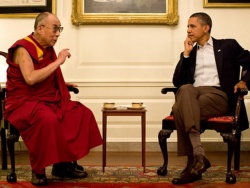Tibet: Dalai Lama wins international award, while protests against China grow
Isabel Hilton, The Guardian, March 29, 2012
Self-immolations have raised the level of tension, protest and distress in Tibet to new heights. Earlier this month, 4,000 students in Tibetan schools in Qinghai protested against the proposed imposition of Chinese as the medium of instruction in their schools. Security forces have raided monasteries, searching for signs of allegiance to the Dalai Lama.
Original Article
Yesterday, Jamphel Yeshi, a 27-year-old Tibetan in exile in India, died in hospital. Two days earlier, in a desperate and harrowing protest against the visit to India of the Chinese premier Wen Jiabao, he had set himself alight in a Delhi street. He suffered 97% burns. In a letter discovered after his self-immolation, he wrote: "We (Tibetans) demand freedom to practice our religion and culture. We demand freedom to use our language. We demand the same right as other people living elsewhere in the world …"
Today, the Dalai Lama was awarded the prestigious Templeton prize, a million-dollar prize awarded each year to an outstanding spiritual leader. In other circumstances, the Templeton prize would have been the occasion for unrestrained celebration for Tibetans, for whom any international recognition of their leader stands as a gesture of moral support for a people whose future looks increasingly bleak. But this award is overshadowed by the mounting toll of sacrifice of young Tibetan lives: in the past year, some 30 Tibetans, men and women, religious figures and lay people, have set themselves on fire.
Their protests are a measure of the despair that has been growing across Tibet since the uprising in 2008 was crushed with an unrepentant brutality. Since then, scores of Tibetans, including writers and public intellectuals, monks and farmers, have been imprisoned and Tibet's monasteries, seen by the Chinese government as the focus of dissent, have been subject to intensified controls and political pressure.
One self-immolation in Tunisia shocked the world and triggered the Arab spring. Thirty self-immolations in Tibet have received little international attention. It took a 30-day hunger strike outside the United Nations in New York by three Tibetans, one of them a senior religious figure, to wring anassurance that UN special rapporteurs would investigate the situation in Tibet. Their hunger strike ended a few days ago.
But if international attention has been scant, the self-immolations have raised the level of tension, protest and distress in Tibet to new heights. Earlier this month, 4,000 students in Tibetan schools in Qinghai protested against the proposed imposition of Chinese as the medium of instruction in their schools. Security forces have raided monasteries, searching for signs of allegiance to the Dalai Lama. Demonstrations, vigils and expressions of moral support for men and women seen as martyrs by the wider population, have been met with ever tighter security lockdown. Fresh reports of incidents arrive almost daily.
For the Chinese government, this is all the Dalai Lama's fault: a spiritual leader, in exile for more than 50 years, they say, is the sole instigator of these tragedies. Beijing seems blind to the fact that Chinese policies over the past half-century in Tibet have been the most important driver of what is a growing call for independence, even in areas where the Dalai Lama traditionally held little sway. Beijing's policies are generating exactly what they were supposed to prevent.
The Templeton award, with its million-dollar prize, in unlikely to change this terrible cycle of events. But it does stand as a rebuke to a regime that has refused to recognise that the Dalai Lama is the best hope for a resolution of a crisis that is costing so much in human suffering and that stands as an implacable moral reproach to Beijing's rule. The Chinese government describes the Dalai Lama as a wolf in monk's robes. In awarding him the prize, the Templeton judges have affirmed the value of peace over violence, and ethical, moral and spiritual values over the power of the state. It could not have been more timely.
